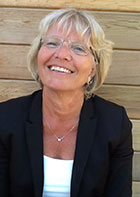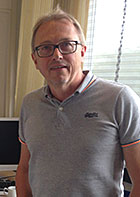World Food Programme (WFP): Efficient knowledge management strengthens relief work
WFP has signed an agreement with the Royal School of Library and Information Science to set up a professional knowledge-management and -organization system that transcends nations and cultures.

Susanne Ørnager
WFP, a UN agency based in Rome and with offices in more than 80 countries, has recognised the need for intelligent digital solutions for managing and sharing knowledge at global level. Knowledge of local conditions, emergency aid and logistics must be readily accessible to enable WPF to mobilise its organisation and staff quickly and effectively in the event of natural disaster, famine or war.
Knowledge across countries and cultures
WFP has signed an agreement with the researchers to set up a professional knowledge-management and -organisation system that transcends nations and cultures. Under this agreement, Susanne Ørnager and Haakon Lund have:
- analysed the users’ (i.e. WFP staff and volunteers) searches for and access to information on the intranet and the internet
- analysed WFP’s information architecture, and submitted recommendations for a new structure that will enable the organisation’s many employees and volunteers to find the information they need more quickly. This encompasses not only the recording of information, but also a navigation structure on the intranet and internet, as well as an effective and unique categorisation system, i.e. a taxonomy.
- helped establish standard terminology and an understanding of knowledge management throughout the organisation.
Synonym rings

Haakon Lund
A glossary will be drawn up to ensure consistent terminology use in all national offices, along with a system of ‘synonym rings’ designed to make information retrieval more efficient. Synonym rings allow users to search for multiple words that refer to the same concept. For example, the search term ‘poverty mitigation’ will also return results for ‘poverty reduction’, ‘poverty alleviation’ and other synonyms.
Implementation
For these initiatives to have the requisite impact, Haakon Lund and Susanne Ørnager recommended that WFP develop a joint Knowledge and Information Management Strategy (KIMS). This will be an improvement on the current situation, which consists of a number of different and isolated systems and processes. In late 2014, based on the researchers’ recommendation, WFP appointed a knowledge and information manager, along with three colleagues, to oversee the implementation process. Also on the researchers’ recommendation, a number of local experts (taxonomy champions) were asked to contribute to the ongoing development and maintenance of the information architecture.
Impact
Lund and Ørnager, via their knowledge, analyses and recommendations, are helping to increase the efficiency of WFP’s relief work, and therefore to ensure that more people receive the requisite aid faster within WFP’s budget framework. The project makes it possible to accumulate more and more information and make it available to those who need it.
In co-operation with departments in Rome and in the field, Lund and Ørnager have developed a common knowledge-management strategy for WFP. New procedures have been developed for the entire organisation, and new employees have been hired with responsibility for maintaining and improving the taxonomy and appointing local experts. An organisational taxonomy – a common language for indexing and seeking information – has been implemented across the whole of WFP. The taxonomy is also being used on the new intranet, which is WFP’s global platform for collaboration, as well as on the new website and in a new online education system for employee skills enhancement.
Further info
Website: https://iva.ku.dk/nyheder/taxonomy-champions/ (in Danish)
Research article: ‘Company Taxonomy development: The case of an international emergency response organization’. Aslib Journal of Information Management, Vol. 68, Nr. 2, 2016, pp. 193–211
Research article: ‘Optimering af informationsarkitekturen i FN’s World Food Programme’. Nordisk Tidsskrift for Informationsvidenskab og Kulturformidling, Vol. 4, Nr. 3, 2015, pp. 37–52 (in Danish)
Contact
Haakon Lund
Associate Professor, the Royal School of Library and Information Science
E-mail: tcm410@hum.ku.dk
Tel. +45 32 34 14 54
Susanne Ørnager
Associate Professor, PhD, the Royal School of Library and Information Science
E-mail: fpm434@hum.ku.dk
Tel. +45 32 34 13 67
